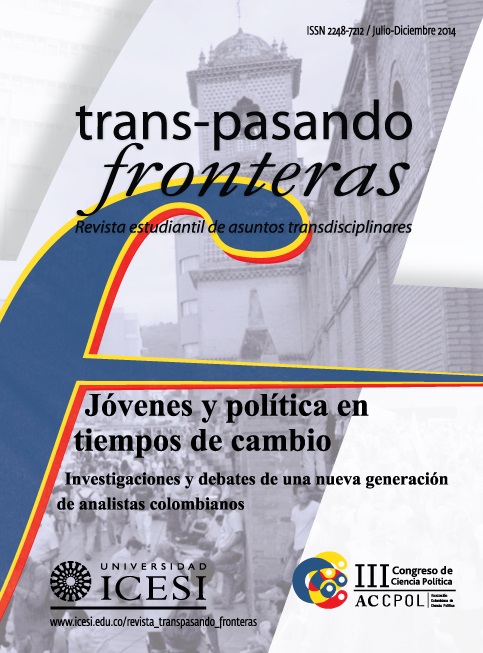Córdoba: Parastate, Clientelism and armed agents
DOI:
https://doi.org/10.18046/retf.i6.1881Keywords:
State, clientelism, Córdoba, Paramilitarism, Drug trafficking,Abstract
The department of Cordoba case could be seen as a relevant example of state weakness to apply its legitimate monopoly of violence and spread its institutions to the entire territory. This is the reason why illegal groups, such as guerrillas and autodefensas, raised throughout the land of rivers Sinu and San Jorge. Also, this context gave rise to parastatal structures whithin the department, which have a strong influence on social, political, military, and economic affairs, and were gradually recognized by the population and the State itself, whom rejected them with the past of the time thereunder its illegal origins. In this sense, it is crucial to ask: ¿To which extent has the department of Cordoba been an example of parastatal structure thereunder theoretical assumptions? This paper aims at answering that question, so, first, give a glance to the theoretical approaches to define a “parastate”, as a basic tool to understand its main origins. Secondly, a differentiation among parastatal, paramilitarismo and autodefensas is presented. On the other hand, the definitions, practices and relations among clientelism, paramilitarismo and violent groups are presented in order to analyze them as indicators to stablish if the department of Cordoba was a parastate during a the period of time we study. Finally, some conclusions are drowned.
Downloads
References
AYALA, G. (2011). Paramilitarismo en Colombia. Mas allá de un fenómeno de violencia politica. Bogotá D.C: Universidad Autonoma de Occidente.
CAMACHO, A. Duncan, G. Steiner, C. Vargas, R. Wills, M. (2009). A la Sombra de la Guerra ilegalidad y nuevos ordenes regionales en Colombia. Universidad de los Andes. CESO. Bogotá D.C.
CEPEDA, I y Rojas, J. (2008) A las puertas de El Uberrimo. Debate. Bogota. D.C.
DANE. (25 de Mayo de 2012). Cuentas departamentales base 2005. Recuperado el 12 de Julio de 2014, de DANE: http://www.dane.gov.co/files/investigaciones/pib/departamentales/B_2005/Resultados_2010.pdf
ESTRADA, J. (2010). Derechos del capital. Dispositivos de protección e incentivos a la acumulación en Colombia. Bogotá D.C: Universidad Nacional de Colombia.
FERRY, S. (2012). Un manual del conflicto colombiano, VIOLENTOLOGÍA. Bogotá D.C: Carvajal.
GARAY, L. Salcedo, E. De León, I. Guerrero, B. (2008). La captura y reconfiguración cooptada del estado en Colombia. Grupo transdisiciplinario de investigación en ciencias sociales, MÉTODO. Fundación AVINA. Corporación Transparencia por Colombia. Bogotá, Colombia
GARZON, J. C. (2008). “La complejidad paramilitar: una aproximación estratégica”. En: A. Rangel, El poder paramilitar (pág. 52). Bogotá D.C: Planeta. Fundacion Seguridad y Democracia.
GUTIÉRREZ, F. (Comp.) (2001). Degradación o cambio, evolución del sistema político colombiano. Editorial Norma. Bogotá D.C
IPSOS- Napoleón Franco (2007). Estudio de Opinión sobre el Paramilitarismo y la “Para-política” en Colombia.
KALYVAS, S., y Arjona, A. (2008). “Paramilitarismo: una perspectiva teorica”. En: A. Rangel, El poder paramilitar. Bogotá D.C.: Planeta. Fundacion Seguridad y Democracia.
LEAL, F. (ed.) (2007). En la encrucijada: Colombia en el siglo XXI. Centro de estudios Sociales de la Universidad de los Andes. Editorial Norma. Bogotá, Colombia.
LOPEZ, C. (2010). Y refundaron la patria... De cómo mafiosos y politicos reconfiguraron el Estado colombiano. Bogota DC: Debate.
ORTIZ, W. (2009). Los paraestados en Colombia: fundamentacion teorica y salidas politicas. Medellin, Colombia: Universidad Autonoma Latinoamericana.
RANGEL, A. Ramírez, W. Garzón, J. Kalyvas, S. Arjona A. Cuéllar, F. Cubides, F. (2008). El Poder Paramilitar. Fundación Seguridad y Democracia. Colombia.
VALENCIA, León y Observatorio de Conflicto Armado (2007). “Los caminos de la alianza entre los paramilitares y los políticos León Valencia y Observatorio del Conflicto Armado”. En: Romero Mauricio (Coordinador). Parapolítica. La ruta de la expansión paramilitar y los acuerdos políticos. Bogotá: CEREC - Corporación Nuevo Arco Iris.
WILLS, M., y Rivera, M. (2009). Poder, familia y clientelismo en Montería, Córdoba (1950-2008). Visibilizacion y ascenso de las mujeres en contextos totalitarios. Bogotá D.C.: Ediciones Uniandes.
Downloads
Published
Issue
Section
License
Trans-pasando Fronteras provides immediate open access to its content on the principle that making research freely available to the public supports a greater global exchange of knowledge.
© Authors hold copyright and publishing rights without restrictions but in accordance with the CC license.
All the material in this publication can be reproduced as long as reference is made to title, author and institutional source.







